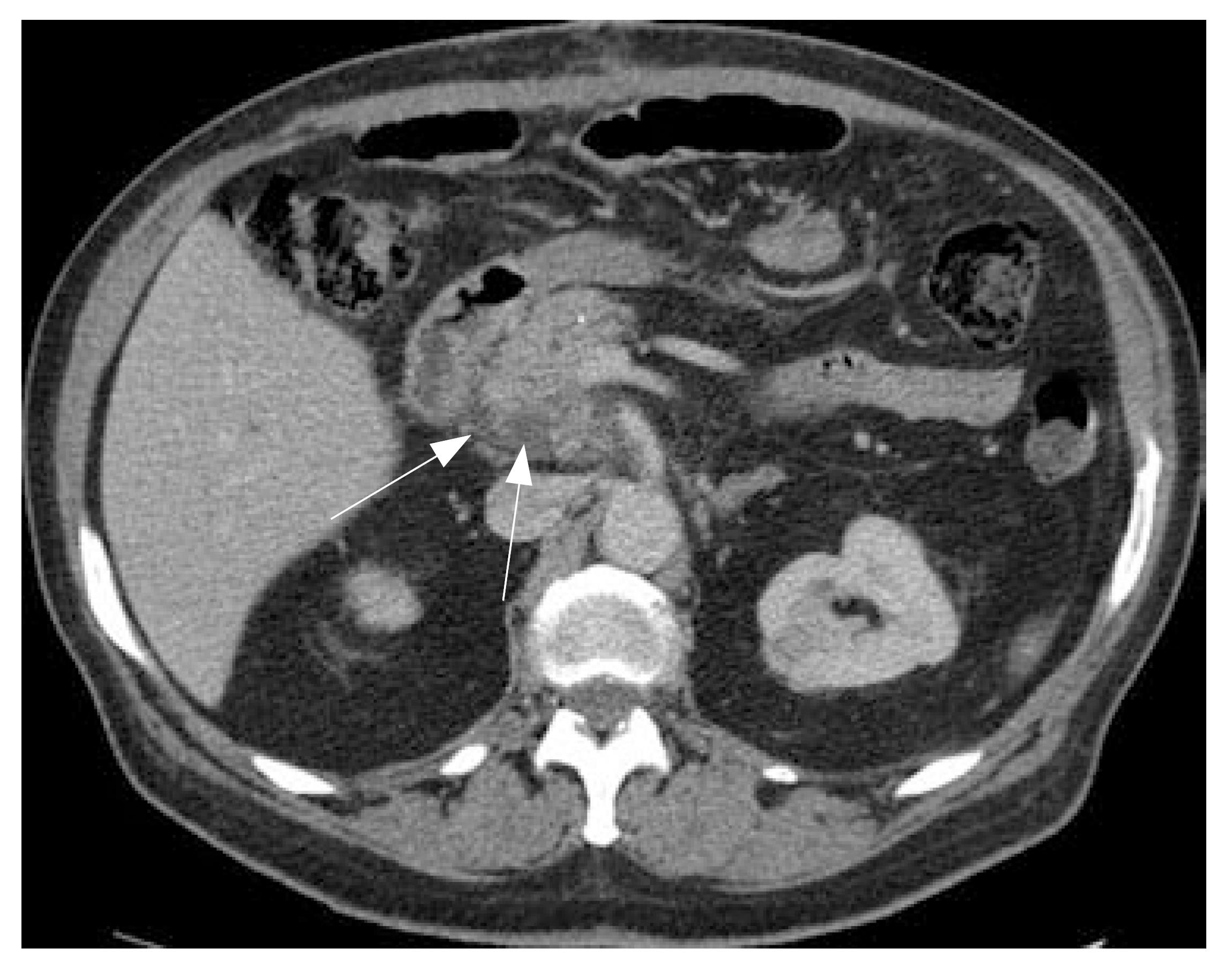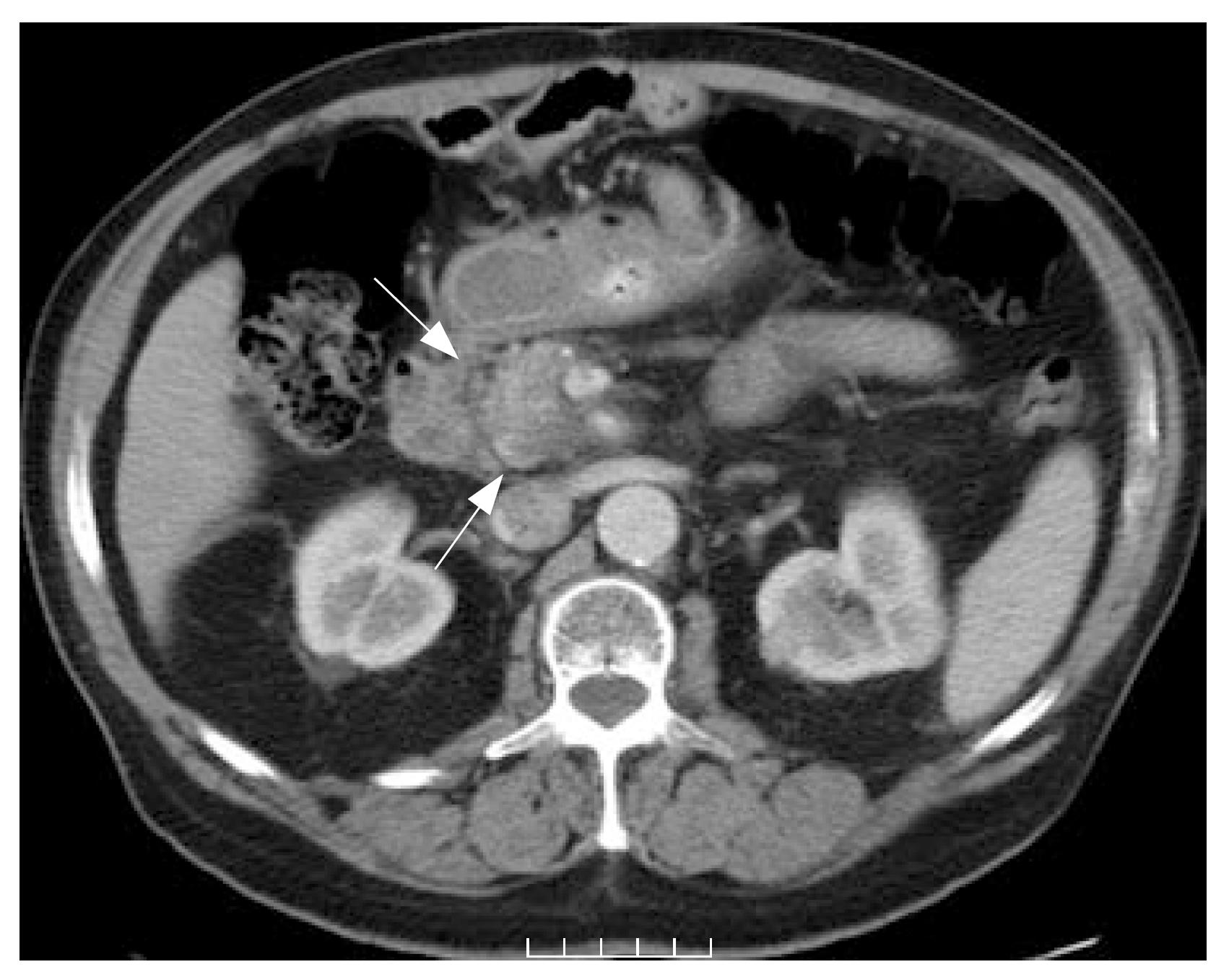Published online Dec 21, 2007. doi: 10.3748/wjg.v13.i47.6433
Revised: September 29, 2007
Accepted: November 11, 2007
Published online: December 21, 2007
Pancreatic cancer is an aggressive malignancy, relatively resistant to chemotherapy and radiotherapy, which usually presents late. Disease specific mortality approaches unity despite advances in adjuvant therapy. We present the first reported case of complete pathological response following neoadjuvant therapy in a locally advanced pancreatic adenocarcinoma.
- Citation: Khan A, Pitsinis V, Mudan S. Complete pathological response following down-staging chemoradiation in locally advanced pancreatic cancer: Challenging the boundaries. World J Gastroenterol 2007; 13(47): 6433-6435
- URL: https://www.wjgnet.com/1007-9327/full/v13/i47/6433.htm
- DOI: https://dx.doi.org/10.3748/wjg.v13.i47.6433
Pancreatic cancer is an aggressive intra-abdominal malignancy and approximately 3000 new cases are diagnosed each year in the United Kingdom, most of them usually present with advanced pancreatic cancer and only 10%-20% of patients are resectable at presentation. Surgery with complete resection of the primary lesion offers the only chance of long term survivorship and cure in this cohort of patients. For locally advanced pancreatic cancer, several chemotherapeutic and combined modality regimens have been described, generally with conflicting results, poor response rates, high toxicity, not changing the natural history of the disease. Several novel and new regimens are being tried in the neoadjuvant setting in patients with locally advanced pancreatic cancer at presentation in the hope of down-staging the disease and rendering it resectable. We present the first case of complete pathological response following down-staging chemotherapy.
A 69-year-old man presented with nausea, anorexia and weight loss. On investigation, he was diagnosed to have locally advanced adenocarcinoma of the pancreas encasing the superior mesenteric artery and vein with enlarged peri-pancreatic and aortocaval nodes (Figure 1). Final staging after endoscopic ultrasound was T4N1M0. The patient had a past medical history of aortic stenosis and atrial fibrillation for which he took diltiazem daily. Shortly after diagnosis he developed obstructive jaundice which was relieved by an endobiliary stent, which failed to achieve adequate drainage, following which he underwent a double bypass in the form of a gastrojejunostomy and hepatojejunostomy.
After a CT guided biopsy which confirmed invasive adenocarcinoma of the pancreas, he commenced chemotherapy with gemcitabine in combination with oxaliplatin. Upon completion of two cycles of chemotherapy, gemcitabine was replaced with capecitabine due to drug interaction causing breathlessness and he underwent 9 cycles of chemotherapy on the new regime. During chemotherapy surveillance cross-sectional imaging suggested stable disease with normal serum CA19-9 levels. After a 4-wk break he further had 6 cycles of the above combination chemotherapy.
Eighteen months from the initial diagnosis surveillance scans demonstrated good local response to the combination chemotherapy without any distant metastatic disease and he was referred for consolidation radiotherapy, of which he had a total of 25 fractions, which he tolerated well and CT scans suggested further reduction in the disease which now looked resectable (Figure 2).
Based on the remarkable response the patient underwent surgery with curative intent in the form of pancreatoduodenectomy approximately 2 years after his initial diagnosis from which he made an uneventful recovery. Histopathology review of the resected specimen showed a complete response with no evidence of the original invasive adenocarcinoma. A follow-up CT scan at 4 mo as shown did not demonstrate any evidence of recurrent disease.
Pancreatic cancer remains a formidable challenge to clinicians and carries a tumour specific mortality of nearly 100%[1]. Complete resection offers the only hope of cure but is applicable to the minority of patients that present with resectable disease. Approximately 10%-20% of patients present with locally advanced pancreatic cancer without evidence of distant metastatic spread at the time of diagnosis. Prior to the use of neoadjuvant therapy these patients were denied surgery with curative intent and had very short survival times after diagnosis.
Several neoadjuvant regimens have been described to try and downstage locally advanced pancreatic cancer and chemoradiation here is considered as an induction therapy to reduce tumour volume, lymph node disease and extent of vascular involvement[2-5]. In locally advanced pancreatic cancer, complete remissions have not yet been described[6]. Neoadjuvant therapy has its own intrinsic advantages in that it theoretically increases vulnerability of cancer cells because of intact vasculature, better tumour cell oxygenation and probability of sterilizing cells at the resection margin. It also affords a test of the biology of the disease in that patients with progressive disease on chemotherapy can be spared an exploratory laparotomy and trial dissection and managed along the palliative pathway. The risk of pancreatic fistula also seems to be decreased in previously irradiated field[7].
Several regimens have been described and utilized in the neoadjuvant setting for locally advanced pancreatic cancer in an attempt to induce regression of the disease and render it resectable with conflicting results[8]. 5-FU based regimens were originally described but had poor response rates and eventually gave way to gemcitabine based regimens[9]. Combined modality treatments using gemcitabine in combination with other agents like capecitabine, oxaliplatin, bevacizumab and irenotecan have shown promise with prolonged progession-free intervals and better response rates[10-12]. In these settings gemcitobine is used as a radiation sensitizer and combination with external beam radiotherapy remains a popular regimen[13].
Complete pathological response remains an elusive goal in this subset of patients who may then be offered a pancreatoduodenectomy with the aim of long term surviviorship or cure, who if untreated have a very short life expectancy. The future of combined modality therapy for locally advanced pancreatic cancer will focus on the development of newer biological agents that target specific alterations in the cancer cells including vascular endothelial growth factor, epidermal growth factor and matrix metalloprotineases[14,15].
In conclusion, complete pathological response following down-staging chemotherapy is possible in patients with locally advanced pancreatic cancer and may offer the patient a chance at long term survival or cure.
S- Editor Zhu LH L- Editor Wang XL E- Editor Liu Y
| 1. | Kim HJ, Czischke K, Brennan MF, Conlon KC. Does neoadjuvant chemoradiation downstage locally advanced pancreatic cancer? J Gastrointest Surg. 2002;6:763-769. [PubMed] [DOI] [Cited in This Article: ] [Cited by in Crossref: 90] [Cited by in F6Publishing: 96] [Article Influence: 4.4] [Reference Citation Analysis (0)] |
| 2. | Bramhall SR, Allum WH, Jones AG, Allwood A, Cummins C, Neoptolemos JP. Treatment and survival in 13,560 patients with pancreatic cancer, and incidence of the disease, in the West Midlands: an epidemiological study. Br J Surg. 1995;82:111-115. [PubMed] [DOI] [Cited in This Article: ] [Cited by in Crossref: 337] [Cited by in F6Publishing: 358] [Article Influence: 12.3] [Reference Citation Analysis (0)] |
| 3. | Sohn TA, Yeo CJ, Cameron JL, Koniaris L, Kaushal S, Abrams RA, Sauter PK, Coleman J, Hruban RH, Lillemoe KD. Resected adenocarcinoma of the pancreas-616 patients: results, outcomes, and prognostic indicators. J Gastrointest Surg. 2000;4:567-579. [PubMed] [DOI] [Cited in This Article: ] [Cited by in Crossref: 1097] [Cited by in F6Publishing: 1094] [Article Influence: 45.6] [Reference Citation Analysis (0)] |
| 4. | Cleary SP, Gryfe R, Guindi M, Greig P, Smith L, Mackenzie R, Strasberg S, Hanna S, Taylor B, Langer B. Prognostic factors in resected pancreatic adenocarcinoma: analysis of actual 5-year survivors. J Am Coll Surg. 2004;198:722-731. [PubMed] [DOI] [Cited in This Article: ] [Cited by in Crossref: 262] [Cited by in F6Publishing: 253] [Article Influence: 12.7] [Reference Citation Analysis (0)] |
| 5. | Lawrence TS, Chang EY, Hahn TM, Hertel LW, Shewach DS. Radiosensitization of pancreatic cancer cells by 2',2'-difluoro-2'-deoxycytidine. Int J Radiat Oncol Biol Phys. 1996;34:867-872. [PubMed] [DOI] [Cited in This Article: ] [Cited by in Crossref: 230] [Cited by in F6Publishing: 237] [Article Influence: 8.5] [Reference Citation Analysis (0)] |
| 6. | Willett CG, Lewandrowski K, Warshaw AL, Efird J, Compton CC. Resection margins in carcinoma of the head of the pancreas. Implications for radiation therapy. Ann Surg. 1993;217:144-148. [PubMed] [DOI] [Cited in This Article: ] [Cited by in Crossref: 270] [Cited by in F6Publishing: 298] [Article Influence: 9.6] [Reference Citation Analysis (0)] |
| 7. | Mancuso A, Calabrò F, Sternberg CN. Current therapies and advances in the treatment of pancreatic cancer. Crit Rev Oncol Hematol. 2006;58:231-241. [PubMed] [DOI] [Cited in This Article: ] [Cited by in Crossref: 68] [Cited by in F6Publishing: 56] [Article Influence: 3.1] [Reference Citation Analysis (0)] |
| 8. | Hoffman JP, Cooper HS, Young NA, Pendurthi TK. Preoperative chemotherapy of chemoradiotherapy for the treatment of adenocarcinoma of the pancreas and ampulla of Vater. J Hepatobiliary Pancreat Surg. 1998;5:251-254. [PubMed] [DOI] [Cited in This Article: ] [Cited by in Crossref: 16] [Cited by in F6Publishing: 18] [Article Influence: 0.7] [Reference Citation Analysis (0)] |
| 9. | Wanebo HJ, Glicksman AS, Vezeridis MP, Clark J, Tibbetts L, Koness RJ, Levy A. Preoperative chemotherapy, radiotherapy, and surgical resection of locally advanced pancreatic cancer. Arch Surg. 2000;135:81-87; discussion 88. [PubMed] [Cited in This Article: ] |
| 10. | Louvet C, Labianca R, Hammel P, Lledo G, Zampino MG, André T, Zaniboni A, Ducreux M, Aitini E, Taïeb J. Gemcitabine in combination with oxaliplatin compared with gemcitabine alone in locally advanced or metastatic pancreatic cancer: results of a GERCOR and GISCAD phase III trial. J Clin Oncol. 2005;23:3509-3516. [PubMed] [DOI] [Cited in This Article: ] [Cited by in Crossref: 681] [Cited by in F6Publishing: 705] [Article Influence: 37.1] [Reference Citation Analysis (1)] |
| 11. | Reni M, Cordio S, Milandri C, Passoni P, Bonetto E, Oliani C, Luppi G, Nicoletti R, Galli L, Bordonaro R. Gemcitabine versus cisplatin, epirubicin, fluorouracil, and gemcitabine in advanced pancreatic cancer: a randomised controlled multicentre phase III trial. Lancet Oncol. 2005;6:369-376. [PubMed] [DOI] [Cited in This Article: ] [Cited by in Crossref: 201] [Cited by in F6Publishing: 207] [Article Influence: 10.9] [Reference Citation Analysis (0)] |
| 12. | Yip D, Goldstein D. Adding irinotecan to first-line gemcitabine improves tumour response in advanced pancreatic cancer. Cancer Treat Rev. 2005;31:236-241. [PubMed] [DOI] [Cited in This Article: ] [Cited by in Crossref: 1] [Cited by in F6Publishing: 2] [Article Influence: 0.1] [Reference Citation Analysis (0)] |
| 13. | Mornex F, Girard N, Delpero JR, Partensky C. Radiochemotherapy in the management of pancreatic cancer--part I: neoadjuvant treatment. Semin Radiat Oncol. 2005;15:226-234. [PubMed] [DOI] [Cited in This Article: ] [Cited by in Crossref: 37] [Cited by in F6Publishing: 41] [Article Influence: 2.3] [Reference Citation Analysis (0)] |
| 14. | Dickler A, Abrams RA. Radiochemotherapy in the management of pancreatic cancer--part II: use in adjuvant and locally unresectable settings. Semin Radiat Oncol. 2005;15:235-244. [PubMed] [DOI] [Cited in This Article: ] [Cited by in Crossref: 8] [Cited by in F6Publishing: 8] [Article Influence: 0.4] [Reference Citation Analysis (0)] |
| 15. | Heidelberger C, Griesbach L, Montag BJ, Mooren D, Cruz O, Schnitzer RJ, Grunberg E. Studies on fluorinated pyrimidines. II. Effects on transplanted tumors. Cancer Res. 1958;18:305-317. [PubMed] [Cited in This Article: ] |










